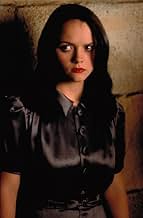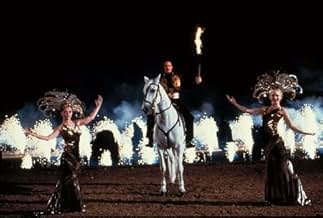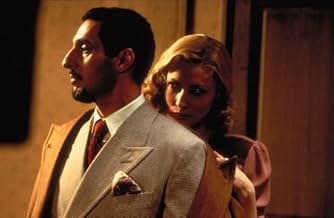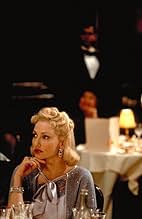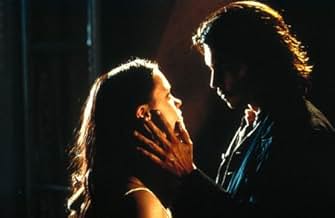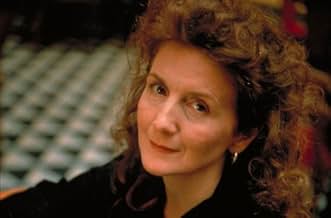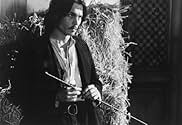VALUTAZIONE IMDb
6,1/10
16.911
LA TUA VALUTAZIONE
Una giovane rifugiata in viaggio dalla Russia all'America alla ricerca del padre perduto si innamora di un cavaliere zingaro.Una giovane rifugiata in viaggio dalla Russia all'America alla ricerca del padre perduto si innamora di un cavaliere zingaro.Una giovane rifugiata in viaggio dalla Russia all'America alla ricerca del padre perduto si innamora di un cavaliere zingaro.
- Regia
- Sceneggiatura
- Star
- Premi
- 3 vittorie e 3 candidature totali
Recensioni in evidenza
Although I agree with those who say that Sally Potter's THE MAN WHO CRIED doesn't entirely live up to her two previous works, I think that even so it is still a very good movie.
Apparently things are slowly starting to get better for THE MAN WHO CRIED. At least it has now been played in several countries in Europe other than Italy (like England, Germany and France) and its score and screenplay are finally being sold by Amazon.co.uk. (I'm hoping the VHS and DVD will soon be available also.) I want to contribute to this movie's current rebirth by saying what I think makes it special and definitely worth seeing.
The first thing that comes to my mind about THE MAN WHO CRIED is its formal visual beauty. It is extremely well directed and there are many scenes that I regard to be among the most beautiful ever filmed. Ms. Potter's talent as a film director is undeniable: her style is a mixture of choreographic elegance and subtle sensuality. I have never seen the camera move like it does in her pictures. In ORLANDO and in THE MAN WHO CRIED alike, it has a way of chasing the characters on scene, of playing with them, of circling around them, that makes it seem like an animated being rather than a mechanical object. It literally seems as if the camera dances with the characters it portrays! None of the movies by other directors I've seen so far are 'written' in this same 'language.' Ms. Potter's personal contribution to the renewal of the existing 'cinematographic grammar' shouldn't be underestimated.
A second striking quality of THE MAN WHO CRIED is the music in it. The director said that 'The intention was to find a way of telling the story where music was carrying emotional and spiritual truth with as much force as the images and the characters.' By frequently reiterating a set of intensely powerful, culturally eloquent and evocative pieces among others, Purcell's Dido's Lament, Bizet's Je Crois Entendre Encore and instrumental pieces by Goliov which serve to remind the characters who they are and where they come from (besides giving the movie cohesion), she succeeds in this difficult task brilliantly. (And courageously: not many film directors, I believe, would dare to make a movie with four opera pieces constantly being sung!) The idea that comes through is that when people are left without their cultural identity and/or dignity, music can save them for forgetting their 'Selves,' save them from silence and incommunicability.
As far as the characters in THE MAN WHO CRIED are concerned, I think they are very well thought out and effectively depicted. It is especially admirable that the director would decide to give life to a 'mute heroine,' Suzie-Fegele, who says almost nothing throughout the whole movie, but expresses herself surprisingly well in spite of this. She conveys, with incredible force, that sense of inadequateness and discomfort so many are left with for life when they are put into a hostile environment during their childhood. Cristina Ricci seems embarrassed at times, and rightly so, for in this movie she plays the part of an outcast, and that's the way an outcast often feels, unfortunately. But there's also strength in her eyes, and determination, and, once again, rightly so, for despite all that fate has unjustly taken away from her, she has learned to go on, to look straight ahead and not ever give in, to live and not to let herself die. Cate Blanchett is an exceptional actress and she performs wonderfully in this movie: both her beauty and intelligent eyes were never this intense and captivating. Johnny Depp is, as always, very talented and very handsome.
As I said at the beginning of my review, this movie isn't quite as good as ORLANDO and THE TANGO LESSON (which were, in my opinion, two absolute masterpieces). While those two movies were perfect from the very beginning to the very end, THE MAN WHO CRIED is perhaps a little uneven, in that along with many breathtaking and superb scenes there are a few instances in which something seems to be missing (overall I rate it 9/10). Also, I personally would have preferred for it to be as multilingual as it was multicultural (then again, I know this probably would have made the movie even less popular). Nonetheless I think THE MAN WHO CRIED has all the qualities of a good art product and I feel perhaps some haven't fully appreciated it because they weren't looking at it as one should look at 'poetry,' but rather as one normally looks at 'prose.' There's so much entailed in it, that needs to be interpreted, as with poetry. Sally Potter doesn't flaunt feelings, but they are there, and I guarantee they can stir you immensely if only you cooperate. Every minute of THE MAN WHO CRIED (which I have seen three times already) gave me something special to think about and remember, and movies don't do that to me very often. Consequently I think it would be a real pity for the public not to support this movie and its director. I think Sally Potter is one of the very best film makers around and I hope our support and enthusiasm will persuade her to do even better next time!
Apparently things are slowly starting to get better for THE MAN WHO CRIED. At least it has now been played in several countries in Europe other than Italy (like England, Germany and France) and its score and screenplay are finally being sold by Amazon.co.uk. (I'm hoping the VHS and DVD will soon be available also.) I want to contribute to this movie's current rebirth by saying what I think makes it special and definitely worth seeing.
The first thing that comes to my mind about THE MAN WHO CRIED is its formal visual beauty. It is extremely well directed and there are many scenes that I regard to be among the most beautiful ever filmed. Ms. Potter's talent as a film director is undeniable: her style is a mixture of choreographic elegance and subtle sensuality. I have never seen the camera move like it does in her pictures. In ORLANDO and in THE MAN WHO CRIED alike, it has a way of chasing the characters on scene, of playing with them, of circling around them, that makes it seem like an animated being rather than a mechanical object. It literally seems as if the camera dances with the characters it portrays! None of the movies by other directors I've seen so far are 'written' in this same 'language.' Ms. Potter's personal contribution to the renewal of the existing 'cinematographic grammar' shouldn't be underestimated.
A second striking quality of THE MAN WHO CRIED is the music in it. The director said that 'The intention was to find a way of telling the story where music was carrying emotional and spiritual truth with as much force as the images and the characters.' By frequently reiterating a set of intensely powerful, culturally eloquent and evocative pieces among others, Purcell's Dido's Lament, Bizet's Je Crois Entendre Encore and instrumental pieces by Goliov which serve to remind the characters who they are and where they come from (besides giving the movie cohesion), she succeeds in this difficult task brilliantly. (And courageously: not many film directors, I believe, would dare to make a movie with four opera pieces constantly being sung!) The idea that comes through is that when people are left without their cultural identity and/or dignity, music can save them for forgetting their 'Selves,' save them from silence and incommunicability.
As far as the characters in THE MAN WHO CRIED are concerned, I think they are very well thought out and effectively depicted. It is especially admirable that the director would decide to give life to a 'mute heroine,' Suzie-Fegele, who says almost nothing throughout the whole movie, but expresses herself surprisingly well in spite of this. She conveys, with incredible force, that sense of inadequateness and discomfort so many are left with for life when they are put into a hostile environment during their childhood. Cristina Ricci seems embarrassed at times, and rightly so, for in this movie she plays the part of an outcast, and that's the way an outcast often feels, unfortunately. But there's also strength in her eyes, and determination, and, once again, rightly so, for despite all that fate has unjustly taken away from her, she has learned to go on, to look straight ahead and not ever give in, to live and not to let herself die. Cate Blanchett is an exceptional actress and she performs wonderfully in this movie: both her beauty and intelligent eyes were never this intense and captivating. Johnny Depp is, as always, very talented and very handsome.
As I said at the beginning of my review, this movie isn't quite as good as ORLANDO and THE TANGO LESSON (which were, in my opinion, two absolute masterpieces). While those two movies were perfect from the very beginning to the very end, THE MAN WHO CRIED is perhaps a little uneven, in that along with many breathtaking and superb scenes there are a few instances in which something seems to be missing (overall I rate it 9/10). Also, I personally would have preferred for it to be as multilingual as it was multicultural (then again, I know this probably would have made the movie even less popular). Nonetheless I think THE MAN WHO CRIED has all the qualities of a good art product and I feel perhaps some haven't fully appreciated it because they weren't looking at it as one should look at 'poetry,' but rather as one normally looks at 'prose.' There's so much entailed in it, that needs to be interpreted, as with poetry. Sally Potter doesn't flaunt feelings, but they are there, and I guarantee they can stir you immensely if only you cooperate. Every minute of THE MAN WHO CRIED (which I have seen three times already) gave me something special to think about and remember, and movies don't do that to me very often. Consequently I think it would be a real pity for the public not to support this movie and its director. I think Sally Potter is one of the very best film makers around and I hope our support and enthusiasm will persuade her to do even better next time!
The only reason I did not rate this film a "10" was that the Christina Ricci character (Feygele/Suzie), who is supposed to be a superb singer in the era before microphones, was not dubbed by someone who can actually sing. (Ricci, gifted actress that she is, can't, and to a musician, that's a problem). Other than that, I loved this movie. Ricci and Depp, as impossible lovers who just happen to be members of the two peoples most persecuted by the Nazis (a Jew and a Gypsy), are both perfection in their roles. John Tuturro and Cate Blanchett, as (respectively) an Alpha-male Italian tenor enamored of Mussolini, and Suzie's fellow dancer/confidante seduced by the tenor and his Fascist tendencies, are such compelling characters that they almost needed their own separate movie. The cinematography is beautiful throughout, and the sense of history, of the sweep of time, is wonderfully evoked. Last but not least, the score of the film memorably weaves together an old Yiddish lullaby with "Je crois entendre encore," the great tenor aria from Bizet's "Pearl Fishers." Both melodies share the same rhythmic and harmonic skeleton, and the film score reveals and celebrates it. A wonderful musical reflection on the theme of the film in general. Wait until the end of the movie to see what I mean -- the music explains it all.
Christina Ricci sings more than she speaks in the movie, but she manages to hold your attention nevertheless for a pretty solid hour and a half in this well-acted and profound, but uneven period piece. Sally Potter, who also directed the similarly problematic "Orlando", clearly has the visual and thematic talent to be a much better respected director than she is - she just needs to learn how to tell a story.
The first forty minutes of the film, which begins in the year 1927, are absolutely masterful. The sublime Claudia Lander-Duke plays young Fegele, an impoverished Russian-Jewish girl whose beloved father decides to journey to America in search of a better life. After that, Fegele and her family are set upon by unnamed bad guys (probably either Cossacks or Communists), and Fegele is separated from them. She ends up on an ocean liner bound for England, where her name is changed to Susan, she is adopted by an English family that doesn't understand her, and she is forced to begin the process of assimilation.
Flash forward ten years or so (Potter is regrettably and consistently unspecific about such things). Fegele (now Suzie and now played by Christina Ricci, she of the large, expressive eyes) wants to be a showgirl so she can earn money to go to America and find her father. She auditions and is accepted by a group based out of Paris. Once in Paris, she rooms and becomes tight with fellow showgirl Lola (Cate Blanchett), a somewhat vapid and materialistic creature with no ambition save that of landing a rich man - which she manages to do in the form of opera singer and Mussolini supporter Dante Dominio (John Turturro, in one of his better performances). Around the same time, Suzie meets and falls in love with Cesare (Johnny Depp), the leader of a band of gypsies.
Once all the dominoes are in place, Potter wastes no time in knocking them down. You can see trouble coming a mile away: Lola, Suzie's one confidant who is aware of her Jewish ancestry, begins falling under the emotional and political spell of anti-Semitic, gypsy-hating fascist Dante. Meanwhile, the Nazis have invaded Poland and, despite everyone's self-assured predictions that they'll stop there, the French border is neither geographically nor historically distant. Suddenly, it's a race against time for all involved, but especially for Suzie - will she stay behind with her gypsy king, or, given a choice, will she escape certain death? The problem with all of this is that it's all so familiar. Potter adds nothing to the old story. There are some wonderful messages in this film about multiculturalism, nationalism, and the sometimes subtle nature of fascism, but if you don't care about the story you're not going to be interested in listening to the messages. The gypsy subplot, for instance, seems tacked on, like it was an excuse to give Ricci a love interest and have him be played by Johnny Depp.
The really interesting plot line here involves Lola and Dante, and I would pay ten dollars to see a movie that was just about them. Both Blanchett and Turturro create real, flesh-and-blood human beings, and it's in their scenes that Potter's writing really soars. Watching Dante sink deeper and deeper into a political philosophy fueled by his own insecurity while the irrepressibly optimistic Lola tries to turn a blind eye to it all is a fascinating and marvelous experience.
Ricci gives a good performance too, although occasionally that Valley Girl tone she uses in most of the rest of her movies slips out a little too much here and there. Fortunately, Potter doesn't give the shy, quiet Suzie very much to say. Most of her acting is done with her eyes, and she's really quite good. Johnny Depp does what he can with Cesare, but there's only so much an actor can accomplish when playing a plot device.
Art direction, music, and cinematography were all top-drawer. As is par for the course with Sally Potter's films, it looked good and had some interesting things to say. I just wish it had been more compelling.
The first forty minutes of the film, which begins in the year 1927, are absolutely masterful. The sublime Claudia Lander-Duke plays young Fegele, an impoverished Russian-Jewish girl whose beloved father decides to journey to America in search of a better life. After that, Fegele and her family are set upon by unnamed bad guys (probably either Cossacks or Communists), and Fegele is separated from them. She ends up on an ocean liner bound for England, where her name is changed to Susan, she is adopted by an English family that doesn't understand her, and she is forced to begin the process of assimilation.
Flash forward ten years or so (Potter is regrettably and consistently unspecific about such things). Fegele (now Suzie and now played by Christina Ricci, she of the large, expressive eyes) wants to be a showgirl so she can earn money to go to America and find her father. She auditions and is accepted by a group based out of Paris. Once in Paris, she rooms and becomes tight with fellow showgirl Lola (Cate Blanchett), a somewhat vapid and materialistic creature with no ambition save that of landing a rich man - which she manages to do in the form of opera singer and Mussolini supporter Dante Dominio (John Turturro, in one of his better performances). Around the same time, Suzie meets and falls in love with Cesare (Johnny Depp), the leader of a band of gypsies.
Once all the dominoes are in place, Potter wastes no time in knocking them down. You can see trouble coming a mile away: Lola, Suzie's one confidant who is aware of her Jewish ancestry, begins falling under the emotional and political spell of anti-Semitic, gypsy-hating fascist Dante. Meanwhile, the Nazis have invaded Poland and, despite everyone's self-assured predictions that they'll stop there, the French border is neither geographically nor historically distant. Suddenly, it's a race against time for all involved, but especially for Suzie - will she stay behind with her gypsy king, or, given a choice, will she escape certain death? The problem with all of this is that it's all so familiar. Potter adds nothing to the old story. There are some wonderful messages in this film about multiculturalism, nationalism, and the sometimes subtle nature of fascism, but if you don't care about the story you're not going to be interested in listening to the messages. The gypsy subplot, for instance, seems tacked on, like it was an excuse to give Ricci a love interest and have him be played by Johnny Depp.
The really interesting plot line here involves Lola and Dante, and I would pay ten dollars to see a movie that was just about them. Both Blanchett and Turturro create real, flesh-and-blood human beings, and it's in their scenes that Potter's writing really soars. Watching Dante sink deeper and deeper into a political philosophy fueled by his own insecurity while the irrepressibly optimistic Lola tries to turn a blind eye to it all is a fascinating and marvelous experience.
Ricci gives a good performance too, although occasionally that Valley Girl tone she uses in most of the rest of her movies slips out a little too much here and there. Fortunately, Potter doesn't give the shy, quiet Suzie very much to say. Most of her acting is done with her eyes, and she's really quite good. Johnny Depp does what he can with Cesare, but there's only so much an actor can accomplish when playing a plot device.
Art direction, music, and cinematography were all top-drawer. As is par for the course with Sally Potter's films, it looked good and had some interesting things to say. I just wish it had been more compelling.
The film, though highly predictable, is not anywhere near as bad as people make it out to be. It's not boring unless your attention span is that of the typical Hollywood absorbed moron. The acting isn't anything worse than the typical product of that filmworld - though it is slightly better. The story, also, is not a completely typical waste. Now that I've mentioned all of these things about the typical, that is unfortunately exactly what this film is: extremely typical beyond comprehension. Everything, down to the lame, supposedly romantic, slow motion scene of Johnny Depp riding his horse, has been done 3049090348 hundred thousand times before. Most of the story makes a remote amount of sense, except that the Russian soldiers who force Ricci's family to leave Russia for some reason that I must have missed are peaking Polish. Well, in the end, since the composition is pretty interesting, and the music is great, it is worth seeing - unless you have no idea about these things and would rather watch Bruce Willis blow things up.
Under the yoke of persecution, people-- collectively or individually-- will find a voice, a way to communicate their plight to the world, to anyone who will listen. Sometimes the whole world will hear that cry, but often it will fall on deaf ears. `The Man Who Cried,' written and directed by Sally Potter, is just such a story, of a people-- Jews-- unimaginably persecuted and attempting to find their voice, that common expression of their suffering and turmoil. And, as is wont to happen in extreme situations, that expression will manifest itself in terms that are universal and defy the barriers of language. The `Man' in this story can be found in hu-MAN-ity, and his cry can be found in the common expression of song: In the aria of the opera, in the songs of the gypsies camping on the outskirts of Paris, or in the a capella intonations of a young Russia girl, a Jew, exiled from her home and adrift, alone, in a world of incomprehensible confusion.
The story begins in Russia, 1927; a man (Oleg Yankovsky) is forced to flee the country for America, leaving behind his young daughter, for whom he hopes to send later, once he is settled. Very soon, however, the preadolescent girl is forced to leave, as well, and winds up alone in England, at a school, where she is given the name `Suzie,' and, being an outsider, suffers the taunts of her peers. And through it all, what keeps Suzie (Christina Ricci) going, is the thought that some day she will be able to join her father (from whom she has not heard since his departure from Russia) in America. In the meantime, Suzie finds solace in singing, while her personal odyssey eventually takes her to Paris (at a most inopportune time for a Jew), where she becomes involved with a dancer named Lola (Cate Blanchett), a renowned opera singer, Dante Dominio (John Turturro) and an enigmatic gypsy, Cesar (Johnny Depp). Now a young woman, Suzie's dreams of America have diminished somewhat, but as the Nazi war machine begins cutting a swath across Europe, her thoughts, with renewed fervor, yet mingled with doubt, turn again to the possibility of joining her father in America.
As with her previous effort, `Orlando,' in 1993, Sally Potter had a definite vision of how to approach and present her story. Unfortunately, she seems unable-- or unwilling-- to share that vision with her audience. The story itself is interesting, if not original, but her disjointed, abstract methods of presenting it make it too obscure to embrace. On the surface, what some may initially consider an imaginative rendering of the material dissolves under closer scrutiny, and the artistic, abstract presentation is revealed as nothing more nor less than the effects of awkward transitions that defeat the very vision Potter was attempting with this film. The `transitions,' in fact, which are so vital to the telling of the story, are actually not so much transitions as they are lurches or jumps, which dramatically distorts the flow of the film. Add to that the lack of character development or delineation, as well as Potter's inability to maintain any tension whatsoever, and the result is a film that is emotionally uninvolving and, at best, unapproachable from the standpoint of the audience. Visually, it has it's moments, especially in the silent exchanges between Suzie and Cesar, but they are simply too few and far between to sustain any interest. And it's unfortunate, because Potter had all the tools with which to work, but didn't know what to do with them.
The performances, too, suffer the same fate as the presentation of the film. Ricci looks stunning-- very reminiscent of a young Elizabeth Taylor, in fact-- and her performance is the highlight of the film; Suzie, at least, is believable. Ricci does well with the material she is given-- which isn't much-- and her lack of dialogue and extended moments of silence may mask, somewhat, the ambiguity of the character. She is wonderfully expressive, however, which at least adds a touch of mystery to Suzie, who because of Potter's lack of attention is not nearly as sympathetic a character as she should be. Ricci has developed a powerful screen presence, quite apparent though unemployed in this film, and hopefully in her next project she will have a director who knows how to use it.
Like Ricci, Cate Blanchett does the best she can with the material, but under Potter's unsteady hand Lola seems out of step with her environment, and despite Blanchett's best efforts comes across as more caricature than character. She certainly tried, however, and attempted to get more out of Lola than was humanly possible. A poorly written stereotype, there was nothing Blanchett could do to save herself, or the character, with this one.
John Turturro suffers the same fate, only more so. Without the necessary guidance, he seems to have a hard time immersing himself into Dante's skin. It's a good effort, but Turturro as Dante is like putting a square peg in a round hole; he just doesn't fit. And the singing voice provided for him defies credibility.
Depp, as well, seems at odds with his character, Cesar, though he suits the part of the silent, brooding gypsy quite well. Again, it's a case of being all dressed up with nowhere to go. The character was not so much poorly written as too ambiguous; to be effective (as he could and should have been), Cesar simply needed some direction, and it was not there.
The supporting cast includes Harry Dean Stanton (Perlman), Hana Maria Pravda (Grandmother) and Claudia Lander-Duke as young Suzie (the best bit of casting in the film; very credible as a young Ricci). The most positive thing that can be said of `The Man Who Cried' is that it had such potential. Alas, it was never tapped; and you're left with the thought of what could have been. I rate this one 4/10.
The story begins in Russia, 1927; a man (Oleg Yankovsky) is forced to flee the country for America, leaving behind his young daughter, for whom he hopes to send later, once he is settled. Very soon, however, the preadolescent girl is forced to leave, as well, and winds up alone in England, at a school, where she is given the name `Suzie,' and, being an outsider, suffers the taunts of her peers. And through it all, what keeps Suzie (Christina Ricci) going, is the thought that some day she will be able to join her father (from whom she has not heard since his departure from Russia) in America. In the meantime, Suzie finds solace in singing, while her personal odyssey eventually takes her to Paris (at a most inopportune time for a Jew), where she becomes involved with a dancer named Lola (Cate Blanchett), a renowned opera singer, Dante Dominio (John Turturro) and an enigmatic gypsy, Cesar (Johnny Depp). Now a young woman, Suzie's dreams of America have diminished somewhat, but as the Nazi war machine begins cutting a swath across Europe, her thoughts, with renewed fervor, yet mingled with doubt, turn again to the possibility of joining her father in America.
As with her previous effort, `Orlando,' in 1993, Sally Potter had a definite vision of how to approach and present her story. Unfortunately, she seems unable-- or unwilling-- to share that vision with her audience. The story itself is interesting, if not original, but her disjointed, abstract methods of presenting it make it too obscure to embrace. On the surface, what some may initially consider an imaginative rendering of the material dissolves under closer scrutiny, and the artistic, abstract presentation is revealed as nothing more nor less than the effects of awkward transitions that defeat the very vision Potter was attempting with this film. The `transitions,' in fact, which are so vital to the telling of the story, are actually not so much transitions as they are lurches or jumps, which dramatically distorts the flow of the film. Add to that the lack of character development or delineation, as well as Potter's inability to maintain any tension whatsoever, and the result is a film that is emotionally uninvolving and, at best, unapproachable from the standpoint of the audience. Visually, it has it's moments, especially in the silent exchanges between Suzie and Cesar, but they are simply too few and far between to sustain any interest. And it's unfortunate, because Potter had all the tools with which to work, but didn't know what to do with them.
The performances, too, suffer the same fate as the presentation of the film. Ricci looks stunning-- very reminiscent of a young Elizabeth Taylor, in fact-- and her performance is the highlight of the film; Suzie, at least, is believable. Ricci does well with the material she is given-- which isn't much-- and her lack of dialogue and extended moments of silence may mask, somewhat, the ambiguity of the character. She is wonderfully expressive, however, which at least adds a touch of mystery to Suzie, who because of Potter's lack of attention is not nearly as sympathetic a character as she should be. Ricci has developed a powerful screen presence, quite apparent though unemployed in this film, and hopefully in her next project she will have a director who knows how to use it.
Like Ricci, Cate Blanchett does the best she can with the material, but under Potter's unsteady hand Lola seems out of step with her environment, and despite Blanchett's best efforts comes across as more caricature than character. She certainly tried, however, and attempted to get more out of Lola than was humanly possible. A poorly written stereotype, there was nothing Blanchett could do to save herself, or the character, with this one.
John Turturro suffers the same fate, only more so. Without the necessary guidance, he seems to have a hard time immersing himself into Dante's skin. It's a good effort, but Turturro as Dante is like putting a square peg in a round hole; he just doesn't fit. And the singing voice provided for him defies credibility.
Depp, as well, seems at odds with his character, Cesar, though he suits the part of the silent, brooding gypsy quite well. Again, it's a case of being all dressed up with nowhere to go. The character was not so much poorly written as too ambiguous; to be effective (as he could and should have been), Cesar simply needed some direction, and it was not there.
The supporting cast includes Harry Dean Stanton (Perlman), Hana Maria Pravda (Grandmother) and Claudia Lander-Duke as young Suzie (the best bit of casting in the film; very credible as a young Ricci). The most positive thing that can be said of `The Man Who Cried' is that it had such potential. Alas, it was never tapped; and you're left with the thought of what could have been. I rate this one 4/10.
Lo sapevi?
- QuizChristina Ricci and Johnny Depp found it strange and amusing to do sex scenes with each other because they first met when she was 9 and he was 26, when he visited the set of her debut film Sirene (1990) to see his then-girlfriend Winona Ryder. She said during an interview with ABC News, "I've known Johnny so long, he's protective of me as an older brother and it's weird to think of having sex with him. So we know enough about each other to laugh at it. He said it was 'like we were rooting around together like pigs.' Anyway, I don't think you ever really deal with sexuality on-screen. There are, like, 50 people watching you, and you're just, like, 'Uh, I hope my ass looks good.' There's no deep feeling there. It's just embarrassing."
- BlooperIn the scene where Suzie is following Cesare and his friends on her bike, they go through a passage where you can see the Eiffel Tower in the background and it is lit up. However, the lights were not added to the Tower until 1986.
- Colonne sonoreJe crois entendre encore (Yiddish Version)
from "The Pearl Fishers"
by Georges Bizet
Performed by Salvatore Licitra and Orchestra of the Royal Opera House
Concertmaster Vasko Vassilev
I più visti
Accedi per valutare e creare un elenco di titoli salvati per ottenere consigli personalizzati
- How long is The Man Who Cried?Powered by Alexa
Dettagli
- Data di uscita
- Paesi di origine
- Sito ufficiale
- Lingue
- Celebre anche come
- The Man Who Cried
- Luoghi delle riprese
- Parigi, Francia(on location)
- Aziende produttrici
- Vedi altri crediti dell’azienda su IMDbPro
Botteghino
- Lordo Stati Uniti e Canada
- 747.092 USD
- Fine settimana di apertura Stati Uniti e Canada
- 93.455 USD
- 27 mag 2001
- Lordo in tutto il mondo
- 1.322.763 USD
- Tempo di esecuzione1 ora 40 minuti
- Colore
- Mix di suoni
- Proporzioni
- 1.85 : 1
Contribuisci a questa pagina
Suggerisci una modifica o aggiungi i contenuti mancanti

Divario superiore
By what name was The Man Who Cried - L'uomo che pianse (2000) officially released in India in Hindi?
Rispondi

